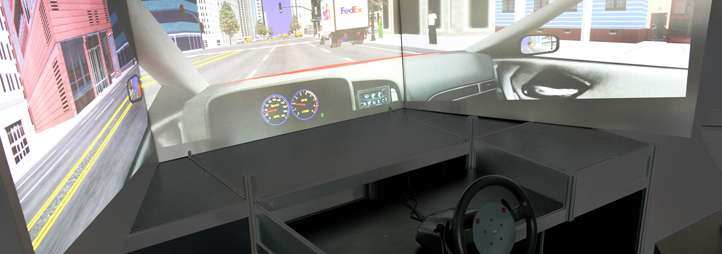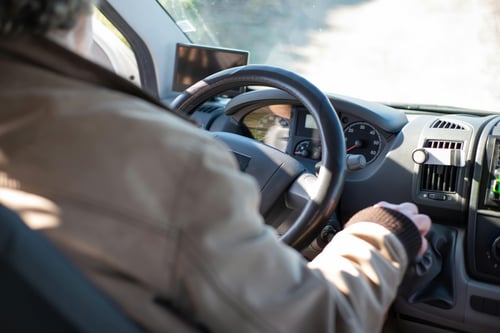Cognitive Aging and Driving Laboratory
About
Participants Needed
Members
Research Activities
Publications
About

In the Cognitive Aging and Driving Laboratory, we carry out research contributing to the understanding of how age and age-related conditions alter certain aspects of cognition (learning, memory, problem-solving, etc.) in the context of experimental tasks developed in our laboratory, and more specifically in relation to mobility and driving. Our projects also address current driving-related issues such as distracted driving, the influence of emotional reactions and their study in real time, the use of simulation to help learner drivers learn to drive, the reinforcement of certain safe behaviours in older drivers, and the assessment of drivers with declining cognitive skills. We invite you to consult our research activities section to find out more about our current studies.
Lab Philosophy
Our lab philosophy is simple: how can we contribute to understand the changes that come with age? As scientists, we have the fantastic opportunity to study an outstanding natural phenomenon that all living entities will go through. Why we age and how old age manifests itself are questions that cause inquiry among hundreds if not thousands of laboratories around the world. Our lab does its share by investigating how old age impacts cognition, from both a fundamental and an applied perspective. The challenge is enormous. Here are a few reasons why:
- Several factors (social, cultural, economical, biological, etc.) are likely to influence how one will age; and
- Cognitive changes associated with old age can range from mild to very dramatic (e.g., in persons suffering from dementia).
Having the opportunity to study older adults is truly unique, and studying why and how we age is certainly one of the most fascinating topics in psychology and its related fields of research.
None of this would be possible without our wonderful volunteers, who dedicate their time to participate in our studies. They come to the lab with a true desire to take part in our scientific endeavors. Not only do they give their best, they also love to share their experiences with the graduate students and the research staff. It is a reciprocal learning experience.
With that spirit in mind, our lab promotes hard work in an enjoyable environment, paired with a profound desire to conduct the best possible research!
Directions
From the Queensway heading East (Highway 417)
Take the Lees exit. At the stop sign, turn left onto Lees. Continue going straight down Lees. You will drive over a bridge. Continue straight through 2 sets of lights. Lees will become King Edward. You will pass straight through another set of lights. Turn left at your third set of lights onto Laurier Avenue. Turn left at the next set of lights onto Cumberland Street. Turn right at the stop sign. Continue straight until you reach Parking Lot K. There will be a designated parking spot labeled "Labo recherche C/C. research lab" where you are able to park without having to pay for parking. The research staff will meet you at your car with the parking pass.
From the MacDonald Cartier bridge
Head south on the MacDonald Cartier bridge. Once across, follow the signs for King Edward South. Take King Edward south for about 1.5 km. Turn right onto Laurier avenue. Turn left at the next set of lights onto Cumberland Street. Turn right at the stop sign. Continue straight until you reach Parking Lot K. There will be a designated parking spot labeled "Labo recherche C/C. research lab" where you are able to park without having to pay for parking. The research staff will meet you at your car with the parking pass.
From Highway 16 North
Follow Prince of Wales Drive to Carling Avenue. Turn right (east) on Carling Avenue. Follow Carling Avenue to Bronson Avenue. Turn left (north) on Bronson Avenue. Follow Bronson Avenue to Laurier Ave. Turn right on Laurier Ave West. Stay on Laurier Ave West for approximately 2 kilometers. You will pass city hall and go over a bridge. After going over the bridge, continue straight on Laurier Avenue. Please remain in the right lane if possible. At the third set of lights, intersection of Laurier and Cumberland, turn right. This will lead you into the main campus. Continue straight until you reach the stop sign. At the stop sign you will take a right and that will lead you to parking lot K. Your parking spot will be labeled “Labo Recherche C./C. Research Lab.”. The research staff will meet you at your car with the parking pass.
PARTICIPANTS NEEDED

The Use of Simulators to Assess Older Drivers Experiencing Cognitive Decline
Our research lab at the University of Ottawa is studying the use of driving simulators in the assessment of older drivers.
We have created a survey exclusively for caregivers and loved ones that will involve viewing short video clips of older drivers - cognitively healthy or cognitively impaired - while they operate a driving simulator.
Your responses to this survey will provide us with valuable insight on how caregivers and loved ones of older adults perceive the use of driving simulators as a tool for assessing fitness-to-drive and for providing feedback about driving safety.
We would greatly appreciate if you could take the time to respond to our survey and if you can also forward this invitation to your network of family, friends, and colleagues. The survey will take approximately 15-20 minutes to complete. To thank you for your participation, you will be given the option to have your name entered into a draw to win an Amazon gift card valued at $100.00 (CAD).
Thank you all for your assistance!
Here is the link to the survey:
https://uottawapsy.az1.qualtrics.com/jfe/form/SV_5o6KsMRtAwYCITQ
Members

Director

Dr. Gagnon is a full-time professor at the University of Ottawa and heads the laboratory. His research interests include the changes in memory and learning associated with older age. Together with his graduate students, he investigates the ability to drive in many populations of drivers, including older drivers, drivers with cognitive limitations, and young male and female drivers. More specifically, his research aims at determining the best ‘cognitive’ predictors of safe driving and how driving safety can be maintained through customized retraining programs.
Sylvain Gagnon
Professor and Director
Room: VNR 3042
Office: 613-562-5800 ext. 2515
Work E-mail: sgagnon@uOttawa.ca
Graduate Students
- Michael Armstrong
Michael is a doctoral student in the clinical psychology program. He completed his master's degree in experimental psychology at Carleton University in 2012 and has a diverse background in youth mental health, behavioral medicine and health psychology. His current research focuses on the development of a protocol for the clinical assessment of older drivers. This project explores the use of driving simulators as a potential tool in the process of assessing driving skills. Through this project, we aim to better understand how to improve the process of assessing the driving ability of patients referred to a memory clinic, and how to better convey the results of these assessments to patients and their caregivers.
Work E-mail: marms010@uOttawa.ca
- Christine Saber
Christine is currently in her 7th year in the Clinical Psychology doctoral program. She specializes with children, adolescents and families and is completing her internship at the Ottawa Carleton District Board. Her research examines the impact of a driving simulator training program on scanning behaviors at intersections for older adults.
Work E-mail: csabe057@uOttawa.ca
- Fatou Sarr
Fatou is a doctoral student in experimental psychology. Her research focuses on the effects of unconscious influences on working memory (the ability to actively hold sequences of items in memory) in young adults. Fatou has carried out a series of 7 studies on this theme and is currently writing her doctoral thesis.
Work E-mail: fsarr2@uOttawa.ca
- Vincent Francoeur
Vincent completed his Honours B.A. in Psychology in June 2023 and joined the Lab shortly after as a master’s/PhD student. He also holds a B.A. and a master’s in economics from Université Laval. Vincent’s interests in experimental psychology include the interdisciplinary study of cognitive and emotion processing. Under the supervision of Dr Sylvain Gagnon, he is currently leading the Emotion Discrimination Data Collection and Analysis Project in collaboration with a team from the School of Electric Engineering and Computer Sciences.
Research Assistants
Current Research Assistants:
- Alina Khan
- Radya Omar
- Annie Théberge Charbonneau
- Tegan Marla Stassen
- Christine Van Houtte
Past Research Assistants:
-
Devon Keough
Past Directed Research Students:
-
Emily Payne
Research Activities

Current studies on driving in older drivers and other populations
The use of driving simulation in a clinical assessment context
Investigators: Sylvain Gagnon (University of Ottawa), Frank Knoefel (Brain and Mind Research Institute, Bruyère Memory Program, Bruyère Continuing Care, Bruyère Research Institute), Arne Stinchcombe (Saint Paul University & University of Ottawa), Rafik A. Goubran, Vice President (Research and International), Chancellor’s Professor (Carleton University), Stephanie Yamin, (Saint-Paul University), Michael Armstrong (University of Ottawa).
Summary: In this research program, we examine new ways to combine simulator driving outcomes to clinical information that physicians and specialized health professional use to determine driving safety of patients experiencing cognitive decline. The ultimate goal consists in simplifying driving simulator assessment and the translation of its outcomes in a way that will facilitate and increase the validity of the clinical decision process. The project is ongoing.
Gender and Driving
Investigators: Sylvain Gagnon (University of Ottawa) & Yara Kadulina (University of Ottawa)
Summary: Many factors have an influence on driving safety. For instance, it is known that young males have higher risk of crash than females of the same age. However, some strong biases in our society associate better driving with male drivers while objective safety indicators tell the opposite. What is the influence of sex and gender on driver’s self-perception and perception of other drivers’ ability? How strong are the sex and gender base biases in regards to driving in our society? Using various methods, we conduct studies that explore the influence of sex on driving across the lifespan. This project is ongoing.
Factors leading to texting and driving
Investigator: Sylvain Gagnon (University of Ottawa)
Summary: The use of smartphones while driving is one of the leading causes of crash. Many drivers report having texted while driving. Why do drivers do respond to their device or even initiate the writing of a text? This is the kind of questions we are exploring in the lab. It is known that driving and texting impairs driving. Yet, it is essential to understand why some drivers keep texting regardless of the elevated risk associated with this behavior. In this project, we explore the factors influencing this risk taking attitude towards texting and driving. The project is ongoing.
Current studies on aging and cognition
Exploring the ‘unconscious’ learning influences in working memory paradigms.
Investigators: Sylvain Gagnon (University of Ottawa) & Fatou Sarr (University of Ottawa)
Summary: In this research project, we examine how unconscious contributions to working memory performance (holding a phone number of one’s mind for a short period of time or writing course notes while listening to a lecture) can be explored and discriminated from conscious processing. Previous studies show that previously learned material or associations can either boost or alter working memory performance. We are exploring this issue using a novel paradigm that enables the study of unconscious influences without interfering with conscious memory processing. The project is ongoing.
Emotion discrimination data collection and analysis project
In our first study, participants watch a series of emotionally inducing film clips while we measure their physiological signals using electrodes and advanced sensors, including an electronic patch and a smartwatch. We also record their verbal expressions of emotions and collect self-reports of emotional instances through short questionnaires. The large resulting multi-modal database will help our team generate new artificial intelligence (machine-learning) models for detecting and discriminating human emotions in a controlled laboratory setting. We are also analyzing relations between stimuli, perceived emotions, emotional behaviors, and physiological signals.
Publications

Recent Journal Articles
Meneghini, V. Mahumane, C., Rodrigues Barbosa, A., Stinchcombe, A. & Gagnon, S. (Submitted). Physical fitness is associated with simulator driving performance in young drivers.
Kadulina, Y., Adema, J.D., Franklin, D., Stinchcombe, A., & Gagnon, S. (Submitted). Who is driving? Confirmation of gendered stereotypes using video sequences of safe and unsafe simulated driving reactions.
Marshall, S., Bédard, M., Vrkljan, B., Tuokko, H., Porter, M.M., Rapoport, M.J., Mazer, B., Gélinas, I., Gagnon, S., Charlton, J.., Koppel, S., MacLeay, L., Mallick, R., Ramsay, T., Stiell, I., Wells, G., Man-Son-Hing, M. (2023) The Candrive Older Driver Risk Stratification Tool. Journals of Gerontology: Medical Sciences. Accessible online.
Gibbings, A., Ray, L.B. Gagnon, S., Collins, C.A., Robillard, R., Foegel, S.M. (2022). The EEG correlates and dangerous behavioral consequences of drowsy driving after a single night of mild sleep deprivation. Physiology & Behavior, 252, 1-6.
Wallace, B., Gagnon, S., Stinchcombe, A., Yamin, S., Goubran, R., & Knoefel, F. (2021). Preliminary Results for the Automated Assessment of Driving Simulation Results for Drivers with Cognitive Decline. 2021 IEEE Sensors Applications Symposium (SAS), 1–6. https://doi.org/10.1109/SAS51076.2021.9530113.
Armstrong, M., Mercier, O., Stinchcombe, A., Yamin, S., Knoefel, F., & Gagnon, S. (In press). Using Video Replay of Simulated Driving to Estimate Driving Safety and Cognitive Status. Safety.
Yamin, S., Ranger, V., Stinchcombe, A., Knoefel, F., Gagnon, S., Bédard, M. (2020). Using serial trichotomization with neuropsychological measures to inform clinical decisions on fitness-to-drive among older adults, Occupational Therapy in Health Care, Nov28, 1-21.
Stinchcombe, A., Marchese, C., Fossum, S., Gagnon, S., Naglie, G., Rapoport, M.J., Weaver, B., Bédard, M. (2021). The effect of social support on the association between driving status and depression symptoms in aging drivers differs by gender: findings from the CLSA. Journal of Transportation & Health, 20, 1-9.
Maxwell, H., Weaver, B, Gagnon, S., Marshall, S., & Bédard, M. (2020). The validity of three new driving simulator scenarios: Detecting differences in driving performance by difficulty and driver gender and age. Human Factors, July, 1-16.
Gagnon, S., Stinchcombe, A., Curtis, M., Kateb, M., Polgar, M., Porter, M., & Bédard, M. (2019). Driving safety improves after individualized training: An RCT involving older drivers in an urban area. Traffic Injury & Prevention, 20, 595-600.
Saber, C., Armstrong, M., Stinchcombe, A., Yamin, S., & Gagnon, S. (2019). Reactions at intersections of drivers with Alzheimer’s disease: The association between neuropsychological assessment and driving errors in a driving simulator. Advances in Transportation Studies: an International Journal, 48, 77-86.
Hua, P., MacLeay, L., Man-Son-Hing, M., Mazer, B., Myers, A., Naglie, G., Odell, M., Porter, M.M., Rapoport M.J., Stinchcombe, A., Tuokko, H., Vrkjlan, B., & Marshall, S. (2019) Self-reported violations, errors and lapses for older drivers: Measuring the change in frequency of aberrant driving behaviours across five time-points. Accident Analysis & Prevention, 123, 132-139. Contribution: 5%. Active role in the redaction of the submitted version of the manuscript.
Hua, P., Charlton, J.L., Ponsford, J.L., Gooden, J.R., Ross, P.E., Bédard, M., Marshall, S., Gagnon, S. & Stolwyk, R.J. (2018). Using Naturalistic Methods to Examine Real-World Driving Behavior in Individuals with TBI Upon Return to Driving: A Pilot Study. Journal of Head Trauma Rehabilitation.
Stolwyk, R.J., Charlton, J.L., Ross, P.E., Bédard, M., Marshall, S., Gagnon, S., Gooden, J.R. & Ponsford, J.L. (2018). Characterizing on-road driving performance in individuals with traumatic brain injury who pass or fail an on-road driving assessment. Disability and Rehabilitation. doi:https://doi.org/10.1080/09638288.2018.1424955
Contact Us
School of Psychology
Faculty of Social Sciences
University of Ottawa
136 Jean-Jacques Lussier
Vanier Hall, Room 3042
Ottawa, Ontario, Canada K1N 6N5
Map
Tel. : 613-562-5800 ext. 2271